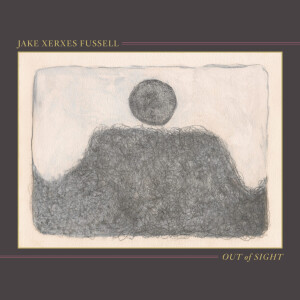 Jake Xerxes Fussell’s previous recording What in the Natural World was one of my favorites of 2017, and on Out of Sight he has upped his game considerably.
Jake Xerxes Fussell’s previous recording What in the Natural World was one of my favorites of 2017, and on Out of Sight he has upped his game considerably.
A native of the South and longtime student of its folk art and vernacular music, Fussell has honed his craft while touring and recording with legendary blues singers, San Francisco folkies and cult guitarists. He himself is a prodigious guitarist and his specialty is rescuing obscure folk and blues songs and reworking them to match his own laconic sensibilities – which is known as the folk process.
Nowhere is that process more amply demonstrated than on the third single released to support this album – actually a double-sided single in the manner of old 45 rpm vinyl singles, the song “Oh Captain” and the instrumental that follows it on the album, “Three Ravens.”
“Oh Captain” was originally recorded by Willis Laurence James in the 1920s. James was a singer and composer, and also a collector of African American work songs who wrote about them. He also taught in the music department at Spelman College, a historically black liberal arts college for women in Atlanta. As interpreted by Fussell, it’s a gently loping narrative of a steamship worker unhappy with his lot. You’ll notice that it features a full band, another first for Fussell, although most of the band members by ones and twos contributed to tracks on his previous release. Nathan Golub’s pedal steel, Nathan Bowles’ drums and Libby Rodenbough’s violin in particular add to the atmosphere on this one.
The instrumental “Three Ravens” has a back-story that’s at least as interesting. It was included by Ruth Crawford Seeger in her collection 19 American Folk Songs for piano; Seeger got it from Carl Sandburg’s songbook The American Songbag. Fussell found a copy of Sandburg’s book at an estate sale in Mississippi, and that copy apparently had belonged to the great American fiddler, folk singer and Mississippi Riverboat pilot John Hartford. Fussell had been enjoying playing the piano version in Seeger’s book, so he went to Sandburg’s original version and adapted it for this record. (I’m always delighted to be able to give a shout-out to Ruth Crawford Seeger and point to her biography.)
The first single was the album’s first track, the equally delightful “The River St. Johns,” a catchy song adapted from a fishmonger’s cry, with harmony vocals by Rodenbrough. It’s a great arrangement – Rodenbrough’s fiddling and Golub’s pedal steel make this one sound like it would fit right in on a Waterboys album. The second was the languid ballad “Michael Was Hearty,” a cautionary tale about a young fellow who marries a girl with money rather than the poor lass he actually loves.
I like all of those songs a lot, but my heart is with “Jubilee” and the album’s other instrumental “16-20.” The former is from the great folk singer Jean Ritchie, and various forms of it have been knocking around the folk scene for a long time. I’ve heard snatches of one or two of its verses in other forms, and the chorus of “Swing and turn, jubilee / live and learn, jubilee” has a timeless feel to it. “16-20” is a gorgeous arrangement featuring a droning bowed upright bass and plucked electric bass guitar behind Fussell’s beautiful fingerpicked electric guitar. Plus some ghostly steel guitar and other ambient sounds that make it wonderfully atmospheric. I’ll let him tell about the tune itself in his own words:
“This was a popular dance piece among guitarists in the lower Chattahoochee River Valley of Georgia and Alabama, including my old friends George Daniel and Robert Thomas, from whom I learned it. I can’t say that this current working of it bears much resemblance to their ’16–20′ which was more of an upbeat buckdancer’s choice, but it’s always evolving for me, which is good because it’s one that I will never stop playing.”
This is a finely wrought album of great American folk songs of the sort that might be lost if not for the likes of Mr. Fussell. I encourage all lovers of Americana to check this one out.
More information on Fussell’s Facebook page and from Paradise of Bachelors.
(Paradise of Bachelors, 2019)
